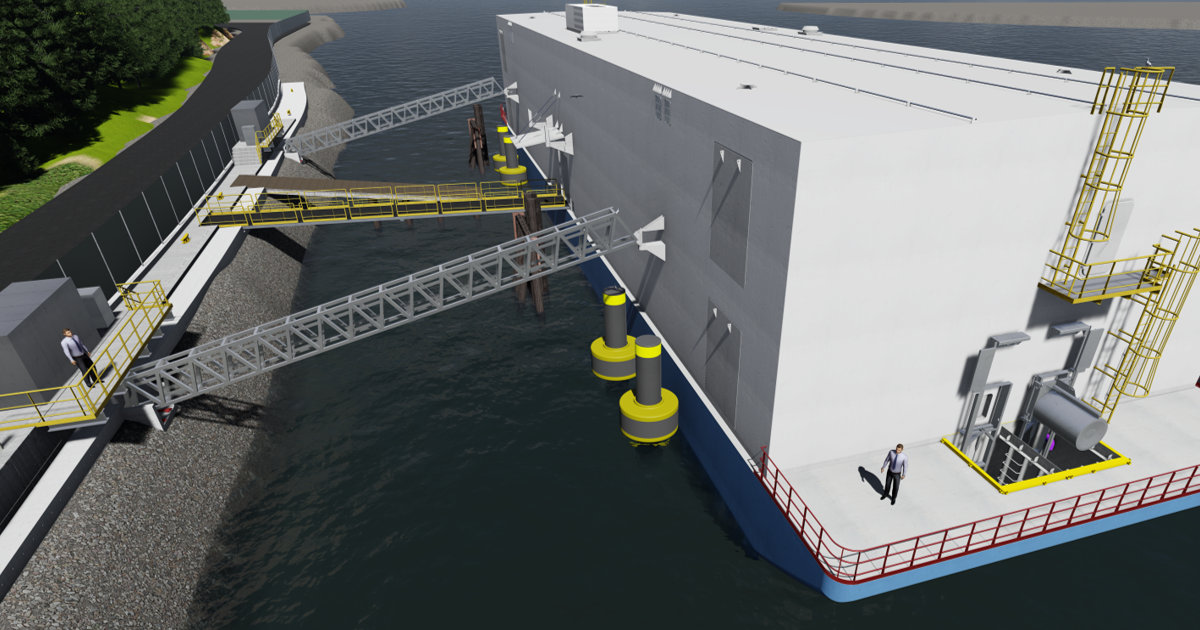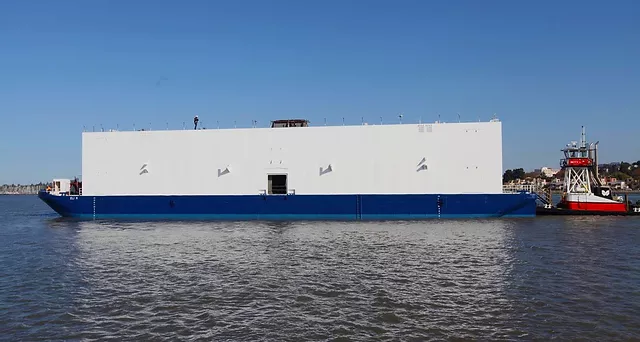
Data centers are becoming more and more important, because everything that we have directly depends on them: economy, entertainment, business, education and civilization itself. More and more data is generated, which means that more data centers are needed. But not every region and climate is suitable for their placement. Where it is hot, a productive and large data center should not be placed.
The fact is that data centers emit a large amount of heat that needs to be removed somewhere. Someone warms this heat nearby homes, well, someone comes radically and builds data centers where it is always cool. No, not beyond the Arctic Circle, although there are such data centers, now we are talking about the surface of the water.
Floating Hydrogen Data Center from Singapore
A business conglomerate from Singapore, Keppel Corp, offered to place the data center on a floating platform, or rather, several platforms at once. It is proposed to remove heat using seawater directly on site. And electricity is generated from hydrogen. As for the latter, we are talking about fuel cells - according to calculations, in some cases, the use of hydrogen is more economical than diesel.
Of course, not everywhere and not always. As a rule, hydrogen cells are used if there are sources of "green" energy near the data center - photovoltaic cells, wind farms, hydroelectric power plants. Surplus electricity on sunny and windy days is used for electrolysis of water. Then hydrogen is stored in special tanks. And then, when there is not enough energy, it is used in fuel cells to generate electricity.

How exactly Keppel Corp will proceed is not yet clear, but a contract for the supply of fuel cells and other equipment has already been signed with Japanese companies Mitsubishi Heavy Industries and Osaka Gas.
Singapore is an economically strong and developed country that needs data centers. But there is very little free land in the country, and it is so expensive that a data center built within Singapore turns out to be truly "golden". It is much cheaper to place data centers on the surface of the water, on floating platforms, which is now done by Keppel Corp together with a partner from Australia - Toll Group.
The data center will be located on a platform similar to those from which oil and gas production is carried out. Now they are getting cheaper, oil companies are reducing production volumes, and some platforms are not in demand, so they can be bought relatively inexpensively for other purposes.

The figure above shows an approximate layout of the various blocks of the data center. The photocells mentioned above, hydrogen storage tanks, modules of the data center itself and the corresponding infrastructure are clearly visible here. Such a facility will consume about 30% less energy than a data center located on land - primarily due to the abundance of cool water.
Keppel started out by repairing tankers and cargo ships in Singapore. Since 2000, she has been working in the data center construction industry. Now it has 27 data centers in Asia and Europe.
Floating data center from Nautilus Data Technologies

In June, we wrote about another flooding data center being developed by Nautilus Data Technologies. It was named Stockton I and was built at the Port of Stockton in northern California. In addition, the same company is building another data center at the docks in Limerick, Ireland. The cost of such a facility is about $ 35 million.
Unlike the previous facility, this one is even more mobile, albeit less productive. The fact is that it was built on the basis of a relatively small barge that was launched back in 1969.
The data center is positioned as a mobile facility that can supplement the existing resources of any company. Of course, in order for such a data center to work, it is necessary to bring the appropriate infrastructure to it - network and energy. As for the cooling, it, as in the previous case, is mastered right on the spot.
Due to the fact that water does not need to be pumped through pipelines from afar, the DC's energy consumption is lower than that of a standard facility of similar capacity. At the test data center of the company PUE was 1.045, at a real site it was slightly higher - 1.15. According to calculations carried out by environmental experts, the negative impact on the environment will be minimal. Local and even more so global ecosystems will not be affected.

Server cooling system based on heat exchangers in the back door of the server rack (manufactured by ColdLogik)
Data center capacity - 6 MW. The average consumption of seawater is 17 thousand liters per minute. Maximum - 45 thousand liters per minute. This cooling method, according to the company itself, makes it possible to five times the power density of IT equipment per rack.
This fall, the data center was finally completed . Most likely, at the end of the year, he will go to the same Singapore. The company received about $ 100 million for this and its other projects .
In general, these two projects are not distant plans, they are real. One has already been completed, the second will soon be completed, since the company that implements it has concluded all the necessary contracts, received permits and started construction.
Why is all this needed?
The advantages of floating data centers were mentioned above, but for the sake of completeness, we will briefly list them:
The main thing is water, which in the case of floating data centers is partially or completely free, and you can take it from anywhere.
Another advantage is mobility. True, this only applies to the data center from Nautilus. It can be deployed almost anywhere in the world where the necessary infrastructure is available. There are not so few such places.
Saving. A floating data center does not need land, which is very expensive in many regions. In addition, due to the features of the cooling system, the cost of heat removal is reduced by at least a third.
Most likely, in the near future, new companies will appear that will offer something similar. Land continues to rise in price, and business needs data centers, their relevance is constantly growing. Perhaps data centers will be built not only on barges, but also on old or no longer needed oil production platforms, because oil is getting cheaper, but the data center is quite the opposite.
